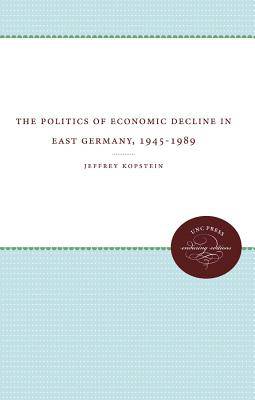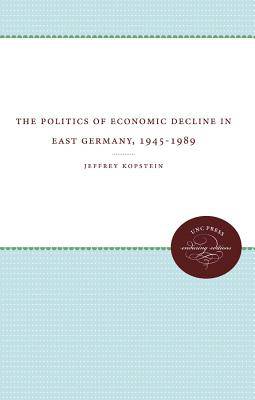
Door een staking bij bpost kan je online bestelling op dit moment iets langer onderweg zijn dan voorzien. Dringend iets nodig? Onze winkels ontvangen jou met open armen!
- Afhalen na 1 uur in een winkel met voorraad
- Gratis thuislevering in België vanaf € 30
- Ruim aanbod met 7 miljoen producten
Door een staking bij bpost kan je online bestelling op dit moment iets langer onderweg zijn dan voorzien. Dringend iets nodig? Onze winkels ontvangen jou met open armen!
- Afhalen na 1 uur in een winkel met voorraad
- Gratis thuislevering in België vanaf € 30
- Ruim aanbod met 7 miljoen producten
Zoeken
€ 76,45
+ 152 punten
Omschrijving
Jeffrey Kopstein offers the first comprehensive study of East German economic policy over the course of the state's forty-year history. Analyzing both the making of economic policy at the national level and the implementation of specific policies on the shop floor, he provides new and essential background to the revolution of 1989. In particular, he shows how decisions made at critical junctures in East Germany's history led to a pattern of economic decline and worker dissatisfaction that contributed to eventual political collapse. East Germany was generally considered to have the most successful economy in the Eastern Bloc, but Kopstein explores what prevented the country's leaders from responding effectively to pressing economic problems. He depicts a regime caught between the demands of a disaffected working class whose support was crucial to continued political stability, an intractable bureaucracy, an intolerant but surprisingly weak Soviet patron state, and a harsh international economic climate. Rather than pushing for genuine economic change, the East German Communist Party retreated into what Kopstein calls a 'campaign economy' in which an endless series of production campaigns was used to squeeze greater output from an inherently inefficient economic system.
Originally published in 1996.
A UNC Press Enduring Edition -- UNC Press Enduring Editions use the latest in digital technology to make available again books from our distinguished backlist that were previously out of print. These editions are published unaltered from the original, and are presented in affordable paperback formats, bringing readers both historical and cultural value.
Originally published in 1996.
A UNC Press Enduring Edition -- UNC Press Enduring Editions use the latest in digital technology to make available again books from our distinguished backlist that were previously out of print. These editions are published unaltered from the original, and are presented in affordable paperback formats, bringing readers both historical and cultural value.
Specificaties
Betrokkenen
- Auteur(s):
- Uitgeverij:
Inhoud
- Aantal bladzijden:
- 258
- Taal:
- Engels
Eigenschappen
- Productcode (EAN):
- 9780807857076
- Verschijningsdatum:
- 1/07/2009
- Uitvoering:
- Paperback
- Formaat:
- Trade paperback (VS)
- Afmetingen:
- 152 mm x 229 mm
- Gewicht:
- 385 g

Alleen bij Standaard Boekhandel
+ 152 punten op je klantenkaart van Standaard Boekhandel
Beoordelingen
We publiceren alleen reviews die voldoen aan de voorwaarden voor reviews. Bekijk onze voorwaarden voor reviews.











